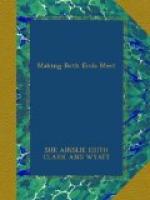She said the doctor had told her that her illness was consumption and that he had cured it. It must have been, of course, not consumption or not arrested in that space of time. But, during it, she had paid him $28.50 and given $22.50 for her board and lodging, with an uncle in the Bronx, and for milk and eggs.
Almost as soon as she was declared able to return to stitching seven hundred belts a day, she hurried back to work. But within a few days the girls struck against the company’s practice of making them buy thread, and were out for five weeks. At the end of this time they won their point.
Altogether her income for the year had been about $150; and the severity and amount of labor she had given in earning it had left her cruelly spent.
She could not possibly live on this amount, as board and lodging alone had cost her $3 a week—$126 for the year. She had been obliged to borrow $50 for her treatment in her illness; and she had not yet paid back this sum. Besides, her landlady had trusted her for some board bills she had not yet paid. For clothing she had spent $26.59,—one dress for $7; one hat for $2; one jacket for $6; two pairs of shoes at $2; a pair for $4; 36 pairs of stockings at 10 cents a pair for $3.60; three waists at 98 cents each for $2.94; and three suits of winter underwear for $1.05. But she said winter underwear of this quality failed to keep her really warm.
In the evening she was too tired to leave the tenement for night school or for anything else. She did her own washing. In the course of a year her only pleasure had been a trip to the theatre for 35 cents.
Anna Flodin lived in a very poor tenement off the Bowery; and she told her experiences in her work, in spite of her muteness and struggle to express herself, with a sort of public spirit, and an almost ambassadorial dignity, which was inexpressibly touching.
That spirit—a fine freedom from personal self-consciousness and clear interest in testifying to the truth about women’s work, and wages, and expenditure of strength—was evinced by countless girls. None, indeed, were pressed for any facts they did not wish to give, nor sought, unless they wished to help in the inquiry. But perhaps because it arose from such an immured depth of youth spent in foreboding poverty, the voice of Anna Flodin’s chronicle was distinctively thrilling.
She told her experience in her work with great clearness, sitting in a little dark, clean room in a tenement, looking out on a filthy, ill-smelling inner court. The only brightening of her grave, young face throughout her story and our questions was her smile when she spoke of her one visit to the theatre, and another change of expression when she spoke of the other girls in the shop, in connection with the strike about thread. She was a member of the Union. In the shop there were girls not members who were willing to continue to buy the management’s thread indefinitely. Anna Flodin said quietly, with a look of quick scorn, that she would never have anything to do with such girls.




